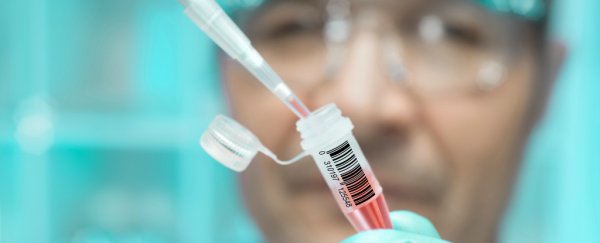A brand new type of HIV vaccine will move onto phase II clinical trials in 2017, after phase I trials showed that it was safe to use in humans.
The potential new vaccine will be tested on 600 people in North America, to see how well it can prevent them from getting the virus.
Before we get too excited, the phase I trials were only set up to show that the vaccine was tolerated well by the human body - they didn't demonstrate if it actually works as a preventative treatment.
But the team saw promising results, with the vaccine triggering an immune response in the HIV-positive patients it was tested on.
"We were very excited with the phase I results," said team leader Chil-Yong Kang, from Western University in Canada.
"The trial demonstrated that our vaccine stimulates broadly neutralising antibodies that will neutralise not only single sub-types of HIV, but other sub-types, which means that you can have the vaccine cover many different strains of the virus."
The results of that trial have been published this week in the journal Retrovirology, and the researchers have announced that they've received regulatory approval to take the vaccine development to the next level as early as September next year.
The vaccine is known as SAV001, and it's made in an entirely different way to previous HIV vaccine attempts - by using particles of 'killed whole' HIV-1 that's been genetically modified not to infect human cells.
Killed whole virus vaccines, also known as inactivated vaccines, are one of the most common types of vaccines out there. Instead of containing just a fragment of a virus, they contain an entire virus that's been killed or modified in some way that it can no longer harm humans.
The vaccine works by exposing the immune system to a safe, dead version of a virus, so it can prepare antibodies against it and be ready to launch an attack as soon as a live version enters the body.
The vaccine strategy has been incredibly effective against a range of viruses - the polio, flu, and hepatitis A vaccines all contained killed whole viruses - but this is the first inactivated vaccine to be trialled against HIV in humans with US Food and Drug Administration (FDA) approval.
The reason it's taken so long to try this approach is that researchers have been concerned that it's not possible to actually deactivate HIV, seeing as it's so quick to evolve and avoid our defences.
But the Western University team swapped out some of HIV's genes with genetic material taken from honeybees, rendering it harmless to humans.
In the phase I clinical trials, the team took a group of HIV-positive patients and gave half a placebo and half the vaccine, to test how their bodies responded.
The results showed that the vaccine was safely tolerated by the immune system, with no adverse reactions reported, and no signs that the inactivated virus had turned virulent.
The group given the vaccine also had a "significant increase" in the pre-existing antibodies against HIV - a sign that it could do the same in people without HIV to help protect them against the virus.
It's too early to get too excited, as many positive phase I trials go on to fail at the next step. But the fact that the phase II trial has been approved to start so soon means we hopefully won't have to wait too long to find out.
The phase II trials will involve testing the vaccine on 600 HIV-negative volunteers across North America as early as September next year.
Around 300 of the volunteers will be from the general population, and 300 will be from groups considered high-risk for HIV infection, including men who have sex with other men; intravenous drug users; sex workers; and those living with an HIV-positive partner.
The team will look at how well these people develop antibodies against HIV, and also whether or not it reduces their risk of contracting the virus.
"If we can show that this vaccine is effective in preventing people from contracting HIV, we can stop the AIDS epidemic and that would be tremendous," said Kang. "It would be a tremendous contribution to humankind, and it would make all of our efforts worthwhile."
So far, HIV and AIDS have killed more than 41 million people around the world, and it's estimated that more than 35 million people are currently infected.
Thanks to new antiviral drugs, people are living longer and healthier with the virus than ever before, but despite 30 years of research and plenty of trials, we still have no long-term way to prevent people getting infected in the first place.
The hope is that this new approach might finally be a way to arm the immune system against the virus.
"It remains to be determined whether this immune response triggered by the vaccine will prevent HIV infection in humans, but we are hopeful," said Kang.
If phase II trials are successful, the final step would be to conduct a worldwide study on 6,000 subjects.
Let's hope progress continues to move quickly, because it would be a great day for the world if we could finally announce a vaccine against one of the most prevalent viral infections of our time.
You can read the full results of the phase I clinical trial in Retrovirology.
